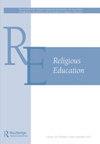儿童的经历很重要:跨学科的方法
IF 0.4
3区 哲学
0 RELIGION
引用次数: 0
摘要
我出生并成长在埃塞俄比亚北部一个叫Kombolcha的小镇。我的母亲是全职工作,父亲是牧师,所以我和我的兄弟们主要是由我们的阿姨、祖母和整个邻居照顾和支持的;这些层层的关系和联系让我相信我属于我亲密的家庭、会众、邻居和社区。我的主日学校、学前班和小学老师以及我在市场上、婚礼上、上学或去教堂的路上遇到的人影响了我的形成和身份认同。当然,所有为我的家庭和社区的安全和健康做出贡献的医护人员和公共领导人也让我感到受到了培育、接受和认可。现在,我在弗吉尼亚神学院担任贝里曼家庭儿童灵性和养育主席,所以我的奖学金来自于我的生活经验,在我的生活经验中,我提倡在特定的环境中解决儿童的整体需求,培养他们的灵性。因此,在这篇文章中,我质疑儿童事工和教育方法,这些方法将儿童描绘成被动的接受者,并将他们的灵性限制在周日早上的几个小时练习中。这些教会、教育项目和课程声称,他们的项目,包括主日学事工,可以塑造孩子们现在和未来的生活和实践生活。然而,儿童的具体和生活经验,周围的社会、政治和文化结构,以及职业经验和实践,都没有考虑到儿童如何塑造他们的代理或精神。我认为,孩子们在个人、社会和政治空间中的生活经历、关系和感受,会影响他们在宗教环境内外如何构建或活出自己的精神。根据伊娃·波鲁哈(Eva Poluha)的四种儿童研究范式,我认为儿童是主观的代理人,让他们感到属于自己或被拒绝的不同的人、地点和空间影响了他们如何形成、构建和重建自己的代理。我把儿童的能动性定义为他们的精神性。而且,儿童的灵性是整体的,包括他们的社会、精神、政治和物质需求、欲望、感觉和发展。我的目的不仅仅是主张儿童的能动性,而是提出一种跨学科的方法,使我们能够探索不同的空间、声音和社区如何影响儿童的能动性和主体性。跨学科的方法来研究儿童的灵性问题的静态和不可动摇的事工和教育方式,通过儿童的生活经验。我定义这个本文章由计算机程序翻译,如有差异,请以英文原文为准。
Children’s Experiences Matter: An Interdisciplinary Approach
I was born and raised in the northern part of Ethiopia in a town called Kombolcha. My mother worked full-time, and my father was a pastor, so my brothers and I were mainly cared for and supported by our aunties, grandmother, and the whole neighborhood; those layers of relationships and connections made me believe that I belonged to my close family, congregation, neighbors, and community. My Sunday school, preschool, and elementary school teachers and the people I met in the market, at weddings, or on the way to school or church impacted my formation and identity. And, of course, all the healthcare workers and public leaders who contributed to the safety and wellness of my family and community also made me feel nurtured, accepted, and recognized. Now, I am working as the Berryman Family Chair for Children’s Spirituality and Nurture at Virginia Theological Seminary, so my scholarship emerges from my lived experience in which I advocate for addressing children’s holistic needs for nurturing their spirituality in their given contexts. Therefore, in this article, I question children’s ministries and educational approaches that portray children as passive recipients and which limit their spirituality to a few hours of Sunday morning practice. These churches, educational programs, and curriculums claim that their programs, including Sunday school ministry, can shape how children live and practice their life now and in the future. However, children’s embodied and lived experiences, the surrounding social, political, and cultural structures, and vocational experiences and practices are not considered in how children shape their agency or spirituality. I claim that children’s lived experiences, relationships, and feelings in personal, social, and political spaces impact how they construct or live their spirituality both within a religious context and outside one. Following Eva Poluha’s four paradigms of childhood studies,1 I claim that children are subjective agents, and diverse people, places, and spaces that make them feel they belong or feel rejected impact how they form, construct, and reconstruct their agency. I define children’s agency as their spirituality. And, children’s spirituality is holistic, including their social, spiritual, political, and material needs, desires, feelings, and developments. My aim is not only to claim children’s agency but to propose an interdisciplinary approach that will enable us to explore how diverse spaces, voices, and communities impact the agency and subjectivity of children. The interdisciplinary approach to studying children’s spirituality questions static and unshakable ways of ministry and education through the lived experiences of children. I define this
求助全文
通过发布文献求助,成功后即可免费获取论文全文。
去求助
来源期刊

RELIGIOUS EDUCATION
RELIGION-
CiteScore
0.90
自引率
28.60%
发文量
46
期刊介绍:
Religious Education, the journal of the Religious Education Association: An Association of Professors, Practitioners, and Researchers in Religious Education, offers an interfaith forum for exploring religious identity, formation, and education in faith communities, academic disciplines and institutions, and public life and the global community.
 求助内容:
求助内容: 应助结果提醒方式:
应助结果提醒方式:


